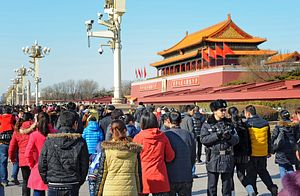On July 1, 2015, China adopted its National Security Law. At the time, most media coverage focused on the areas of the law that had come under fire from concerned foreign governments (most notably the potential for restrictions on foreign investment and the effect on China’s already narrow space for free expression). One particular aspect of the law went largely unheeded, until last week: Article 14 establishes April 15 as “national security education day.”
Accordingly, last Friday was marked with a new propaganda push designed to educate citizens on the national security threats lurking in their midst. “Pamphlets, posters and animations have been distributed in government organizations, schools, businesses, and housing complexes,” Xinhua reported, all for the goal of “raising awareness of national security among the public.”
President Xi Jinping himself issued instructions urging China to “enhance people’s national security awareness.” In addition to his titles of president and the general secretary of the Communist Party of China (CPC), Xi also chairs the recently created National Security Commission (NSC), which apparently provided the inspiration for the April 15 date. The NSC held its first official meeting on April 15, 2014.
China’s “national security education day” is best understood as part of an ongoing emphasis on national security, which began in earnest with Xi’s ascension to the CPC’s top position. The creation of the National Security Commission was announced at the 2013 Third Plenum, the first major Party meeting after Xi assumed control. Six months later, the NSC held its first meeting. By January 2015, China’s Politburo had adopted a new national security strategy. And this year, China’s new Five Year Plan contained an entire chapter on “Building a National Security System.”
These moves are all linked by a common narrative: China as a nation faces unprecedented threats and challenges; strong CPC leadership (and, implicitly, leadership by Xi in particular) is the only way for China to safely weather the current storms; the CPC will thus expand its ability to guard against national security threats.
In China, the question of national security focuses on maintaining Party control and leadership first and foremost. As Xinhua put it just after the passage of the National Security Law, “The new law covers almost every aspect of public life in China. Its mandate includes politics, defense, finance, environment, cyberspace and even culture and religion.” That means, in turn, that the CPC is legally equipped to define acceptable behavior in all those spheres – the law is as much about preventing “negative cultural influences” (Chapter II, Article 23) as it is about improving China’s border, coastal, and air defenses (Chapter II, Article 17).
Thus the emphasis in the overseas media on one particular facet of the national security push – the repeated warnings against foreign spies – only tells part of the story. Cautionary comics about foreign agents seducing Chinese government employees make for good headlines, and there’s no denying the obsession among Chinese leaders about purging foreign influence from the country (see the recent tirade accusing a Disney movie about talking animals of being an avenue for U.S. “brainwashing”). That has real world implications, with the recent increase in arrests of foreigners accused of espionage. In 2015, Chinese authorities detained at least three Japanese nationals and one American on charges of spying.
Against this backdrop, China is equipping and actively urging its citizens to join the fight to defense China’s national security. One online animated video released by the Ministry of State Security in honor of national security education day reminds viewers that average citizens are expected to report potentially harmful activities to the authorities. In return, they can expect to receive unnamed rewards. The video shows a baby (who has just reported a bank robbery by a gang of Batman villains) receiving trophies and applause from an anthropomorphic version of the National Security Law.
But the emphasis on national security education goes beyond the supposed threat posed by foreigners. Citizens are urged to report suspicious behavior in other realms as well – witness the hefty rewards offered for tips about potential terrorist activity in Xinjiang. For reporting on their neighbors, Xinjiang residents can receive up to 5 million yuan ($770,000), Radio Free Asia reports. Informants also receive awards for reporting on suspicious religious activities as well.
When it comes to foreign “subversion,” there are two elements: the nefarious foreigners as well as the Chinese citizens who fall under their influence. China’s national security strategy is aimed at both sides of the equation – rooting out both foreigners and those who subscribe to “foreign values” (including, as China’s leaders have made clear, freedom of speech, and freedom of the press). Thus the national security strategy outlined in the 13th Five Year Plan calls not only for tougher counterespionage, but for tighter censorship, particularly online, and the continued promotion of traditional Chinese culture.
It may be useful to think of the current emphasis on national security as the beginning of another “people’s war.” To go along with the emphasis on enlisting citizens to fight terrorism, China is equally fervent in telling its citizens to stay vigilant against perceived threats to China’s national security, whether that means foreigners who show a keen interest in secret government documents or online bloggers who question Beijing’s policies. Both, China’s authorities would like you to know, are potentially fatal to the nation.

































